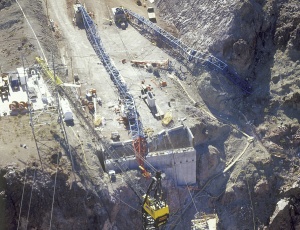A four-year-long legal spat over Hoover Dam Bridge project's collapsed cableways has come to a close with a private settlement stemming from an April 20 arbitration ruling. On Sept. 15, 2006, a refurbished 42-year-old cableway system leased from American Bridge Co., Coraopolis, Penn., toppled over during 50-mph winds, bringing construction to a halt and delaying completion by two years. The 1,900-ft-long, 277-ft-deep twin-rib arched bridge will now open in early November.

In 2005, a general contracting joint venture led by Obayashi Corp., San Francisco, with PSM Construction USA Inc., Brisbane, Calif., signed a two-year, $105,000-a-month lease to use two pairs of 330-ft-tall lattice-framed towers with 2,500-ft of 3-in-dia. cableway strung between them over the Black Canyon, roughly a quarter-mile downstream from Hoover Dam. The high lines, as workers call them, function like a heavy-duty clothes line that shuttle 104 precast bridge segments into place 890 ft over the Colorado River.
The Nevada South tower fell after six months of incident-free use. It occurred after 3:00 p.m. without a live load. Obayashi/PSM blamed �tubular corrosion, welding defects, and other weakened conditions� for the collapse and sought $74 million in damages and delays. Yet, the joint-venture successfully negotiated a pact with the Federal Highway Administration to waive the contractual 1,217 working day schedule, which carried $8,000 per day in liquidated damages, prior to arbitration ruling. FHWA never ruled the incident a force majeure.
FHWA spokesman Doug Hecox declined to discuss settlement details or litigation, but noted that $240 million will finish within its original budget.
American Bridge Co., meanwhile, claimed that the joint venture's improper rigging led to cableway system collapse and sought $6 million for destroyed equipment. A three-person panel arbitrated the case in Las Vegas over 28 days and determined that �neither side established with certainty � the actual cause of collapse.� It rejected Obayashi/PSM�s claims for a lack of �proof,� but American Bridge Co. was entitled to reimbursement for lost lease revenue and equipment damage, with interest. The final settlement amount remains confidential.
�Ultimately, the joint venture's theories as to what caused the collapse could not be supported by engineering analysis,� says American Bridge Co. attorney Dave Dial, with Atlanta-based Weinberg, Wheeler, Hudgins, Gunn & Dial LLC. �The award completely exonerates American Bridge of the system collapse.�
The lease agreement specified the joint-venture was responsible for cableway erection, testing, operation and maintenance. Subcontractor South Lindon, Ut.-based, Olsen Beal Associates, who had been tapped for installation, testified that Obayashi/PSM didn't attach storm guys, or supplementary ties downs used to beef-up cableway stability, the morning of the collapse. �Obayashi failed, on a regular basis to attach the storm guys,� the ruling states, adding that �clamps had not been sufficiently tightened.�
Although the arbitration panel's decision is moot due to a settlement, the claim that the panel attributed the failure to a cause is incorrect,� said Obayashi counsel Tom McGuire in a statement. �In fact, the three lawyer panel opined that it could not determine the cause.�

Post a comment to this article
Report Abusive Comment